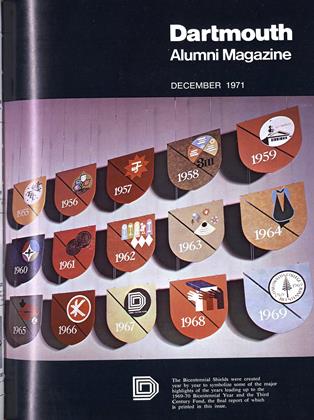MORALS WITHOUT MYSTERY: A LIBERATING ALTERNATIVE TO ESTABLISHED MORALITY BASED ON BERTRAND RUSSELL'S VIEWS APPLIED TO CURRENT PROBLEMS.
DECEMBER 1971 JOHN HURD '21MORALS WITHOUT MYSTERY: A LIBERATING ALTERNATIVE TO ESTABLISHED MORALITY BASED ON BERTRAND RUSSELL'S VIEWS APPLIED TO CURRENT PROBLEMS. JOHN HURD '21 DECEMBER 1971
By Lee Eisler '30. New York: PhilosophicalLibrary, 1971. 118 pp. $4.95.
Mr. Eisler is a retired businessman (food, watches, and advertising), who produced his first book at 60. If he refers to the ancient Spartans' approval of homosexuality, cites St. Thomas' arguments against divorce and incest, and alludes to Uzzah's sacrilegious hand, is the learning of Bertrand Russell (1872-1970) on which he relies. Mr. Eisler was eager to rewrite Russell because many Americans associate Russell only with immorality (teaching mathematical logic at CCNY, he might corrupt the young) and because too few are cognizant of Russell's "enlightening and liberating" ideas.
Relying chiefly on Human Society inEthics and Politics, Mr. Eisler in fewer than 118 printed pages attempts to simplify complexities. The Eisler tone is accordingly different from Russell's, "less like a book on philosophy and more like one on applied navigation."
Is conventional morality acceptable in the light of present-day knowledge? Answer: no. One may no longer believe in the literal truth of the Bible. We must discard conscience as a basis for workable right and wrong. Morality must be established as a means rather than an end. Happiness should be the criterion of conduct. "The happiness of all men impartially" should be our goal. "Rational morality (based on an ethic of happiness) accommodates selfish motives (as well as altruistic ones), and seems likely to serve everyone's (primitive) self interest, and is conducive to survival in an H-bomb world." Happiness is not, however, a question for ethics or morals but for science to instruct us how to "aim at the target," and morality would simply approve of what science tells us. An action would be judged moral or right "if it seemed likely to produce the most happiness (or the least unhappiness), no matter whose." Mr. Eisler then evaluates the desires for possessions (the necessities of life), the incompatible desires (acquisitiveness, rivalry, vanity, and love of power), and the possibilities of controlling and refining them.
Concrete questions of varying importance about morality must be asked, and Mr. Eisler asks them. Was it immoral to drop the A-bomb on Japan? To practice euthanasia? To buy liquor from a bootlegger? To ignore someone's cry for help? To take drugs? Cheat on exams? On taxes? Punish criminals? Build high-powered automobiles? Is pleasure morally good or bad? Can human nature change? How many of the Ten Commandments must be scrapped?
Russell has complemented Eisler by stating that Morals Without Mystery is a well-written presentation of the kind of morality he [Russe11] believes in and advocates. Eisler compliments Russell by suggesting that Morals Without Mystery may perhaps even tempt some persons into reading Russell in the original.
 View Full Issue
View Full Issue
More From This Issue
-
 Feature
FeatureSome Views About Dartmouth Athletics From the Man Who Directs the Program
December 1971 By Clifford L. Jordan '45 -
 Feature
FeatureThe President's Answers to Some Questions During Radio Interview
December 1971 -
 Feature
FeatureThird Century Fund Final Report
December 1971 -
 Feature
FeatureUp Huayna Potosi, Down the Urubamba
December 1971 By Andrew C. Harvard '71 -
 Feature
FeatureThe Trustees Vote "Yes"
December 1971 -
 Feature
FeatureText of President Kemeny's Announcement
December 1971
JOHN HURD '21
-
 Article
ArticleCancer Pain Reduced Through His Research
December 1948 By JOHN HURD '21 -
 Article
ArticleTHE NEW FRONTIER
February 1953 By JOHN HURD '21 -
 Books
BooksTHE BULLS AND THE BEARS: HOW THE STOCK EXCHANGE WORKS.
DECEMBER 1967 By JOHN HURD '21 -
 Books
BooksSELECTED WRITINGS OF OSCAR WILDE.
JUNE 1969 By JOHN HURD '21 -
 Books
BooksPOEMS AND PERSPECTIVES.
NOVEMBER 1971 By JOHN HURD '21 -
 Books
BooksFurther Mention
MAY 1972 By JOHN HURD '21
Books
-
 Books
BooksIn Christ's Own Country
-
 Books
BooksMEDIEVAL MENAGERIE
March 1953 By Churchill P. Lathrop -
 Books
BooksSWITZERLAND ON FIFTY DOLLARS
May 1934 By Frederic P. Lord -
 Books
BooksWHO'S ZOO IN THE GARDEN
June 1941 By Herbert F. West '22 -
 Books
BooksTrade Associations
August 1921 By James P. Richardson -
 Books
BooksPSYCHOLOGY
June 1952 By MAX SCHOEN


